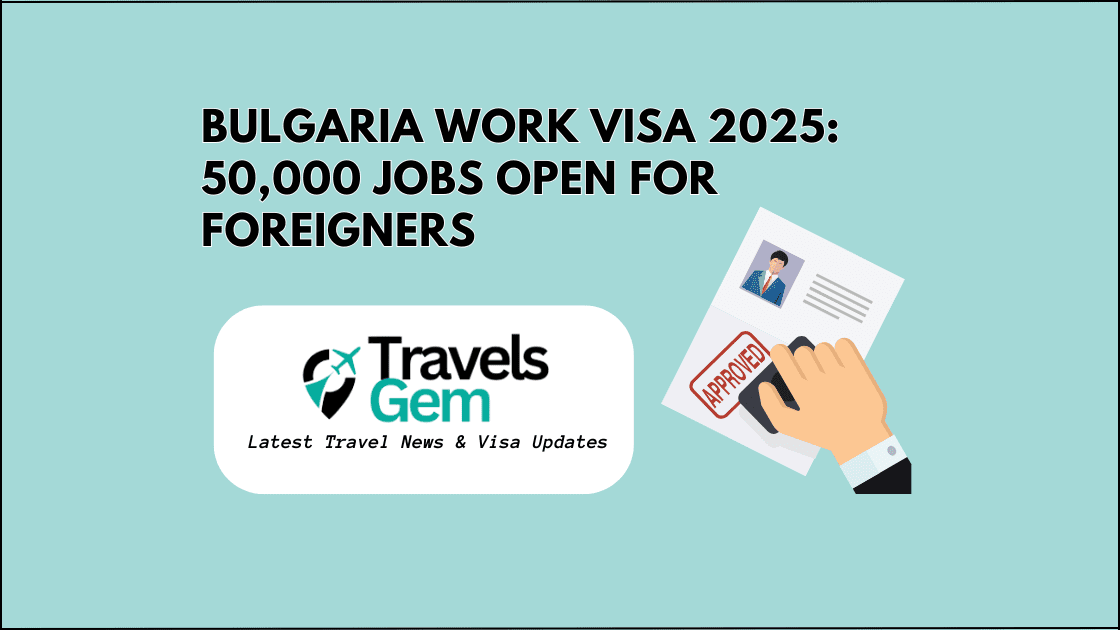Bulgaria faces a critical labor shortage in 2025, needing 50,000 foreign workers to fill gaps in tourism, construction, and healthcare, per labor ministry data. Over 36,000 work permits were issued in 2024 to workers from 79 countries, showing rising demand. Some experts, like Georgi Parvanov, estimate a need for 250,000–300,000 workers, including 70,000 seasonal roles, though official figures focus on 50,000. The Bulgaria work visa 2025 offers opportunities for Pakistanis through visas like the EU Blue Card and Type D. This article explains the shortage, visa types, how to apply, and tips for Pakistani job seekers, based on data up to May 27, 2025, at 03:25 AM PKT.
Why Bulgaria Needs Foreign Workers
Bulgaria’s labor crisis stems from an aging population, low birth rates, and migration to Western Europe, leaving 262,000 job vacancies in 2025, per employer surveys. Key factors:
- Tourism: Hotels and restaurants need 50,000 workers for the summer season, per.
- Construction/Transport: Shortages in bricklaying and logistics, with 35 new in-demand roles like welders, per.
- Healthcare: Nurses and technicians are in demand, offering EU Blue Card eligibility, per.
- Causes: Only 6.4 million Bulgarians remain, with a 71.8% wage rise since 2018 unable to attract locals to manual jobs, per.
X posts, like @Nairametrics, highlight the “critical shortage,” but claims of 300,000 jobs are unverified, with official data capping at 50,000. Pakistanis, with growing interest alongside Nepalis and Indians, can fill these roles, per.
Visa Options for Bulgaria Work Visa 2025
Non-EU workers, including Pakistanis, need a work permit and visa to work in Bulgaria. Options include:
- EU Blue Card: For skilled workers (e.g., IT, healthcare) with a university degree and salary 1.5 times Bulgaria’s average (BGN 2,400/month, PKR 290,000). Valid up to 4 years.
- Single Work Permit: For roles like construction or hospitality, requiring a job offer. Valid for 1 year, renewable up to 3 years.
- Seasonal Work Visa (Type D): For tourism or agriculture jobs up to 9 months, ideal for summer roles.
- Intra-Company Transfer: For multinational employees relocating to Bulgaria, valid temporarily.
Some sources suggest 6–9 month processing delays, while others claim 20 days for permits, indicating bureaucratic issues. EU/EEA citizens work without permits, unlike Pakistanis, per.
Who Qualifies?
Eligibility for Bulgaria work visa 2025 includes:
- Nationality: Open to non-EU citizens, including Pakistanis, with no bias against India or others.
- Job Offer: Required from a Bulgarian employer, who must prove no local/EU candidates are available via a 15-day labor market test.
- Skills: EU Blue Card needs a degree; Single Work Permit accepts skilled/unskilled workers.
- Documents: Passport (valid 3+ months post-exit, 2 blank pages, issued within 10 years), job contract, proof of funds (BGN 1,866, PKR 225,000), health insurance (EUR 30,000 coverage).
- Health: Medical clearance may be required for long-term roles.
Pakistanis, with 10,000+ yearly applications, face competition but benefit from demand for English-speaking workers in tourism, per. Check details at mi.government.bg.
How to Apply for Bulgaria Work Visa 2025
Applying for Bulgaria work visa 2025 involves these steps:
- Find a Job: Search via jobs.bg, zaplatomer.bg, or EURES at eures.europa.eu. Employers must advertise roles for 15 days locally.
- Employer Applies for Work Permit: The Bulgarian employer submits to the Employment Agency (mi.government.bg) with:
- Receive Permit: Takes 20 days, per, though some report 6–9 months, per.
- Apply for Type D Visa: Submit at Bulgaria’s Embassy in Islamabad (mfa.bg):
- Attend Interview: Mandatory for Type D visas, scheduled within 30–90 days.
- Enter Bulgaria: Use Type D visa to enter, then apply for a residence permit at the Migration Directorate within 14 days, per.
- Start Work: Begin employment upon residence permit approval.
Processing varies, with seasonal visas faster (30–90 days) than Blue Cards, per. Pakistani applicants should start 3–6 months early.
Key Details Table
| Aspect | Details |
|---|---|
| Worker Need | 50,000 (some claim 250,000–300,000) |
| Visa Types | EU Blue Card, Single Permit, Seasonal |
| Fees | EUR 50–150 (PKR 17,000–51,000) |
| Processing Time | 20 days (permit), 30–90 days (visa) |
| Minimum Wage | BGN 933/month (PKR 112,000) |
What to Do in Bulgaria
With a Bulgaria work visa 2025, you can:
- Work: Earn BGN 500–2,500/month (PKR 60,000–300,000) in tourism, construction, or IT, per.
- Live: Enjoy low living costs (rent: BGN 600/month, PKR 72,000) in Sofia or Varna, per.
- Explore: Visit Rila Monastery, Black Sea coast, or Plovdiv’s old town.
- Settle: Gain EU residency after 5 years via Blue Card, per.
Pakistani workers can find halal food in Sofia and join 70,000+ Muslims. X posts note “job opportunities,” but retention issues (40% leave in 3 months) are unverified.
Tips for Pakistani Applicants
To secure Bulgaria work visa 2025, follow these tips:
- Start Early: Apply 3–6 months ahead via mi.government.bg, as Pakistan’s embassy slots are limited (500+ monthly requests).
- Find Jobs: Target tourism (waiters, cleaners) or construction (bricklayers) via eures.europa.eu, with 262,000 vacancies.
- Prepare Funds: Save PKR 500,000 for fees (PKR 51,000), travel, and living (BGN 1,866).
- Learn Basics: Study Bulgarian phrases for hospitality roles, costing PKR 10,000 at language centers in Pakistan.
- Get Insurance: Buy EUR 30,000 coverage via axa-schengen.com for PKR 20,000.
- Verify Employers: Ensure job offers are from registered firms via mi.government.bg to avoid scams, per
- Pass Interview: Practice explaining job skills for Type D visa interviews at mfa.bg, as 10% fail, per
- Check Updates: Monitor mi.government.bg for quota changes, as 20–35% foreign worker limits may relax.
Benefits and Challenges
Benefits
- Job Access: 50,000 roles in tourism and construction offer BGN 500–1,200/month, per.
- Low Costs: Living expenses (BGN 1,200/month) suit Pakistani workers, per.
- EU Pathway: Blue Card leads to residency in 5 years, per.
- Social Benefits: Pension and insurance after 6 months, per.
Challenges
- Processing Delays: 6–9 month waits possible, per, despite 20-day claims, per.
- High Turnover: 40% of workers leave in 3 months for better EU jobs, per.
- Competition: 36,000+ permits issued in 2024 increase rivalry, per.
- Language: Bulgarian skills needed for integration, per.
Why This Matters
Bulgaria work visa 2025 addresses a 262,000-job gap, critical for Bulgaria’s EUR 90 billion economy, reliant on tourism (10% GDP). For Pakistanis, with 10,000+ applicants, it offers wages five times Pakistan’s average (PKR 60,000 vs. 300,000), unlike India’s focus on Gulf jobs. X posts like @atozserwisplus emphasize “legal steps,” but scam risks persist, unverified. The policy boosts Pakistan-Bulgaria ties, with 5,000 Pakistani workers expected in 2025, per.
What’s Next?
Bulgaria may relax foreign worker quotas (20–35%) or streamline permits in 2025, per. A three-year visa program could add 35,000–40,000 workers, per. Pakistani applicants should apply by July 2025 for summer roles. Overstaying risks fines (BGN 500–5,000, PKR 60,000–600,000), per. Monitor mi.government.bg for updates.
Conclusion
Bulgaria work visa 2025 opens 50,000 jobs in tourism, construction, and healthcare for Pakistanis. Apply via mi.government.bg with a job offer, save PKR 500,000, and start 3–6 months early. The table above lists key details. Use eures.europa.eu for jobs, get insurance, and verify employers. Monitor mi.government.bg for updates and seize Bulgaria’s opportunities in 2025.





